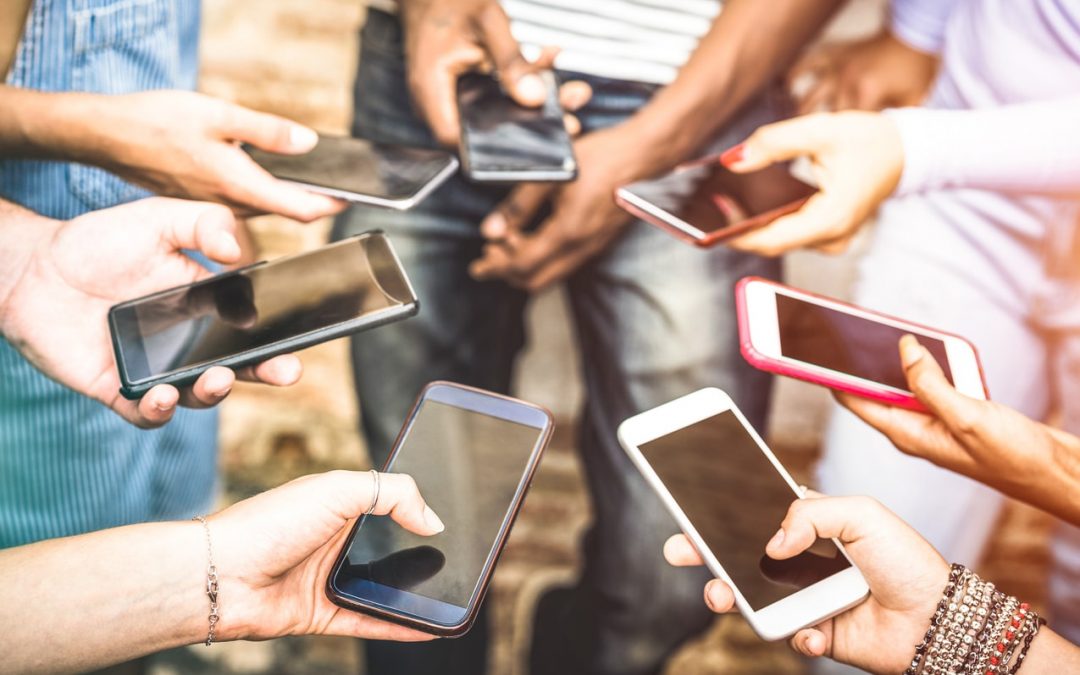We Are Addicted to Our Phones
According to data from eMarketer, smartphone users in the United States spend an average of 3 hours, 10 minutes per day on their phones. Additional research shows that Apple device users unlock their phones up to 80 times a day, and they tap, swipe, and scroll 2,617 to 5,400 times per day. If these stats alone don’t prove we have an addiction to our phones, Neuroscientists studying the effects of social media on the brain are also finding that positive interactions (such as someone liking your tweet) trigger the same kind of chemical reaction that is caused by gambling and recreational drugs. The “reward” of checking social media notifications releases dopamine, which makes you feel good. However, the dopamine effect only lasts for a few minutes and then you feel the need to check your phone again for the same reaction.
The constant need to check our phones has been liked to increased levels of anxiety, stress and depression, as well as poor quality of sleep. In addition, it also significantly increases the risk of car injury or death. Further research even shows that too much social media usage can lead to poor self-esteem, body image issues, and higher risk of suicide, especially in teenagers. It is clear something needs to change, but what exactly can be done when our society runs on technology? The answer is digital minimalism.
What is Digital Minimalism?
Don’t worry, digital minimalism isn’t prohibiting the use of all technology. Instead, it is a concept of mindfulness. When the first iPhone came out in 2007, the idea wasn’t to let it control our lives the way smartphones do today. Cal Newport, the author of Digital Minimalism: Choosing a Focused Life in a Noisy World,” explains that digital minimalism is “a philosophy that helps you question what digital communication tools (and behaviors surrounding these tools) add the most value to your life.”
The idea is to be mindful and intentional with your phone usage. When it comes to social media specifically, aim to only post and browse content that has a purpose for being there. Whether that is to connect with others, share helpful information, inspire and motivate, or simply spread positivity. Social media shouldn’t be a way to “showoff” your life or compare your life to others. It should be a way to build community, raise awareness for causes, or share support. When the focus shifts from benefitting yourself to benefitting others, you will notice both physical and mental health benefits.
Our Challenge to You!
As we head into 2020, we have a digital minimalism challenge for you! Start monitoring your phone usage, either with Screen Time on apple devices or a third-party app from the app store. Then, ask yourself if those hours and minutes spent on your phone were productive and meaningful, or if you are allowing your phone to distract you. If you notice you are mostly using your phone out of boredom, the second part of the challenge is to make a change. When the brain is bored, reaching for your phone is the easiest way to get entertainment. However, if you resist that urge, you will feel motivated to do something else, such as go to gym, go for a walk, meditate, meet a friend for coffee, run errands, etc.! Even just one week of mindful phone usage and replacing bored scrolling with other activities can have positive effects on your health.
We’d love it if you would accept our challenge and leave us a comment letting us know how it went! Also, if you are looking for your next good read, we highly recommend Cal Newport’s Digital Minimalism!



